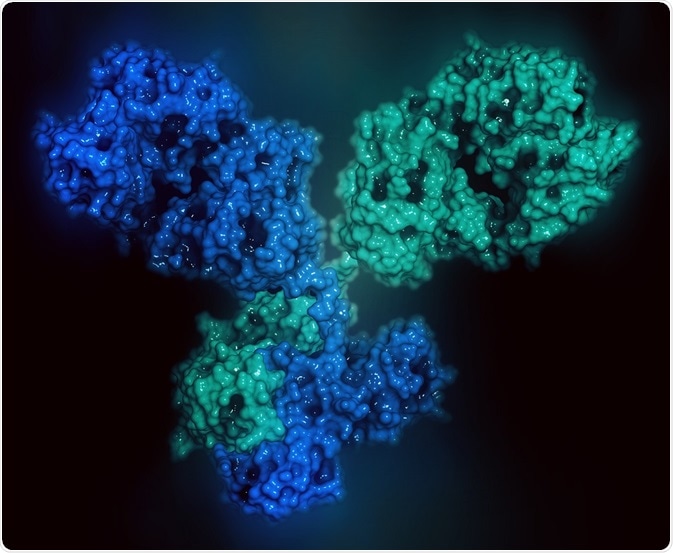Differential scanning calorimetry (DSC) is a technique which involves the sensitive measurement of the difference in the amount of heat required to increase the temperature of an analyte and that of a reference (such as an empty aluminium pan) as a function of temperature, whilst keeping both at almost the same temperature as each other.

Monoclonal antibodies are analysed using DSC Credit: molekuul-be/ Shutterstock.com
The temperature of the sample holder increases steadily over time, and the heat capacity of the reference is already established over the range of temperatures used in the experiment. The calorimeter is kept at the same pressure enabling the heat flow to be measured as a measure of enthalpy change. DSC can be of either heat-flux type or power-compensated types.
Applications
DSC is used to study phase transitions such as melting and exothermic decompositions, and glass transitions. In these experiments, molecules change from one conformation to another. It also establishes specific temperature points termed thermal transition temperatures or melting points for samples in solid, suspended or dissolved form. It is used as an industrial quality control technique as it can establish sample purity and detect the presence of impurity in a drug formulation, for instance. It gives a wealth of information regarding both the physical and energy properties of the substance.
Characterization of drugs
The pharmaceutical industry needs to have drugs which have been precisely characterized for the purpose of accurately defining the parameters of production. This includes knowing at what temperature undesirable phase changes will occur, for instance, crystallization of a drug. The conditions can then be adjusted to produce the desired phase, e.g. the amorphous powder form.
Monoclonal antibodies
Another field of application is in the analysis of monoclonal antibodies which are being increasingly used for the treatment of various medical conditions. These must be processed so as to ensure a monomeric state for therapeutic efficacy, and must be stable as well as non-aggregating.
However, the purification and viral clearance procedures have been found to induce changes in the molecular conformation because of the acidic milieu. These need to be understood properly to define manufacturing guidelines, as well as ensure stability and minimal antibody aggregation at the pH levels used at various parts of the process.
Nanosolids
The use of nanosolids in pharmaceutical formulations is also becoming a big development, although intensive research into their properties is required. Their quantification in drugs has depended upon DSC which can measure the amount of the amorphous or crystalline phase of these molecules. This helps to monitor the way these compounds behave under experimental conditions which will determine the regulatory framework of manufacturing processes.
Nanostructured lipid carriers and solid lipid nanoparticles are also being studied as potential carriers in drug delivery, which could be of the greatest use in various therapeutic applications. These nanospheres seem to be capable of delivering drugs with greater effect, achieving better tolerance and biodegradability, being more bioavailable, and crossing the blood-brain barrier to specifically target the brain tissues.
The solid nanoparticles can be used to develop emulsions, control the rate and site of drug delivery, and form liposomes as well as coat the active drug against biochemical denaturation or breakdown. Moreover, it is possible to develop an industrial cycle to produce these particles on a large scale. The disadvantages of this formulation include drug expulsion and reduced drug entrapment efficiency, both of which can be overcome by different methods of nanoparticle crystal formation. Thermal analysis of these structures is carried out using DSC.
Solid-state drug formulations
Solid-state analysis is responsible for most of the suitability of DSC in pharmaceutical research. Crystalline solids and polymorphic forms can be characterized, detected and identified. DSC is especially important in the study of solid dispersions and polymers which are being increasingly used in drug formulations.
Another use is in research on lyophilization, as well as studies of solid-state drug kinetics. This helps to understand how drugs become more or less stable under various conditions. Accelerated storage conditions may be simulated followed by DSC of samples to detect drug recrystallization after extrusion as amorphous drug.
Further Reading
Last Updated: Feb 26, 2019